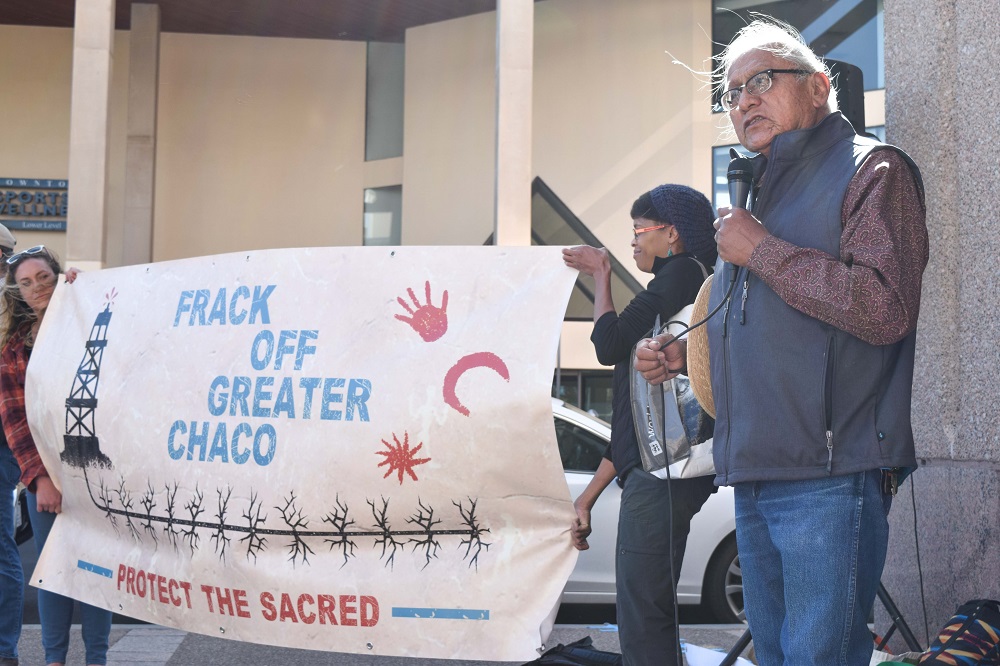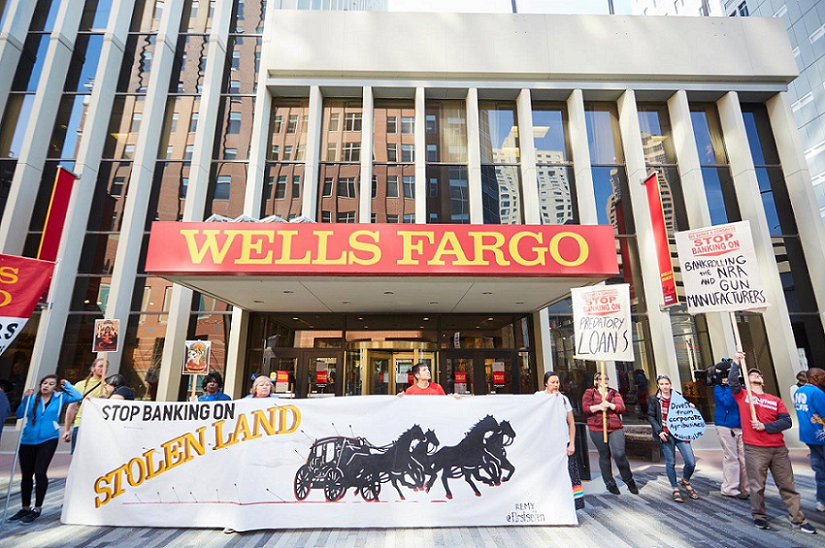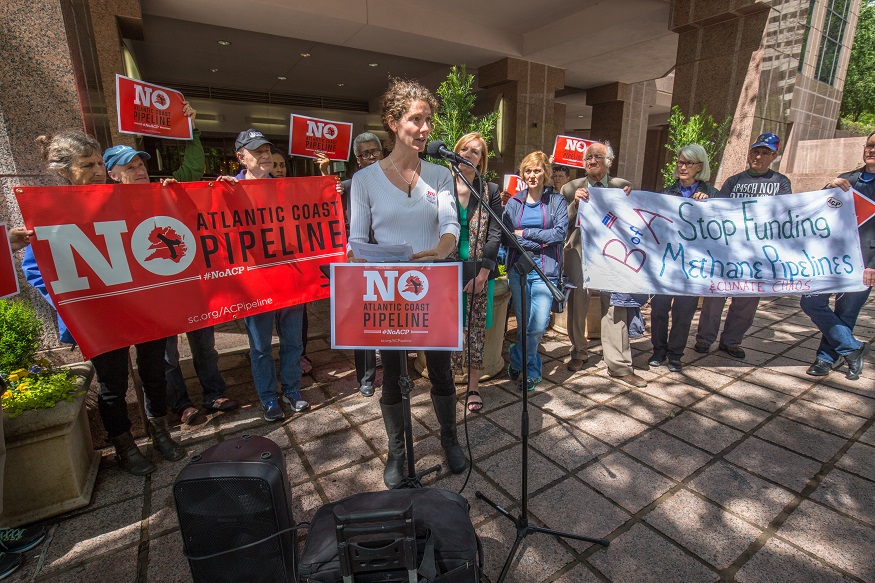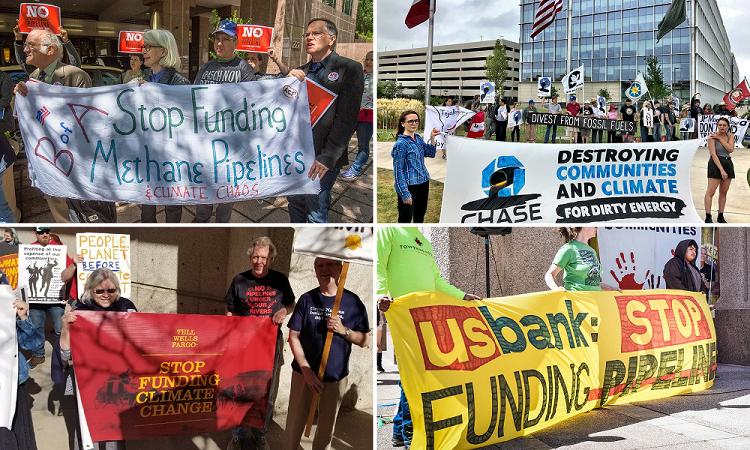This spring, some of America’s biggest commercial banks gathered for their annual general meetings (AGMs). Historically, there usually isn’t much action surrounding these meetings -- shareholders and executives gather in an office park or event center somewhere and vote on various resolutions related to the bank’s business practices and investments.
But this year, the growing movement calling on banks to stop funding dirty and dangerous fossil fuel projects has been taking these meetings by storm, as people seek to hold banks accountable for their investments that threaten our climate and communities.
There’s quite a bit to hold these banks accountable for. Despite many of them making public statements about their commitments to sustainability and social responsibility, major banks are still pouring money into extreme fossil fuel projects. According to the 2018 fossil fuel finance report card, which the Sierra Club released along with some of our partners earlier this year, major banks' funding for extreme fossil fuels actually increased over the past year, including a 111 perent increase in financing for tar sands, one of the dirtiest fuel sources on the planet.
We know that there’s a better way for banks to do business. Some of the largest banks in Europe and the world -- such as BNP Paribas, HSBC, Royal Bank of Scotland, and ING -- have taken action in recent months by adopting policies to end financing for some of the dirtiest fuels. Major banks in the U.S. are lagging behind, and their customers, investors, and the public are taking notice.
Throughout April and May, we joined forces with concerned communities and other organizations to show up at a string of AGMs and sent a clear message that the days when banks could quietly fund destructive projects without the public taking notice are over.
In New Mexico, we rallied with local Indigenous and community groups outside the U.S. Bank shareholders meeting in Albuquerque. Beyond Dirty Fuels Campaign organizer Cheryl Johncox traveled from Ohio to join our Rio Grande Chapter and the Stop ETP coalition of local and national environmental and Indigenous groups to call on U.S. Bank to end all financing of fossil fuel projects and to implement policies that recognize and honor Indigenous and human rights. At the rally, Cheryl called attention to U.S. Bank’s financing of Energy Transfer Partners -- the company behind the disastrous Rover Pipeline in Ohio and many other destructive projects -- in spite of its commitment last year to stop funding pipelines. Community leaders also spoke out against U.S. Bank’s financing of fracking in the Greater Chaco Canyon region, which continues to directly affect the health and safety of local tribes.

Photo: Niko Dellios
In Iowa, hundreds of people rallied outside the Wells Fargo shareholders meeting in Des Moines to hold the bank accountable for its continued support for dirty, dangerous fossil fuel projects like the Keystone XL and Dakota Access pipelines, as well as its consumer-fraud scandals, discriminatory lending, support for the gun industry, and more. Sierra Club Iowa Chapter chair Carolyn Raffensperger wrote an op-ed in the Des Moines Register that week to demand that, “rather than funding destructive practices and industries that threaten Iowa and our country, Wells Fargo should be investing in infrastructure and projects that add to the well-being of our communities.” The protests at Wells Fargo’s AGM were also covered widely in national media outlets, including CNN, Bloomberg, LA Times, CBS, and CNBC.

Photo: Iowa Citizens for Community Improvement
Then, in North Carolina, local Beyond Dirty Fuels campaign organizer Caroline Hansley organized a rally at the Bank of America shareholders meeting in Charlotte to highlight the bank's financing for the Atlantic Coast Pipeline and the Mountain Valley Pipeline, as shown in recent research published by Oil Change International. The proposed ACP would run over 600 miles through West Virginia, Virginia, and North Carolina, with the potential to go into South Carolina, slicing through pristine forests, scenic lands, and waterways. Bank of America is one of the leading banks on a multibillion-dollar loan covering half the construction cost of the ACP, with Bank of America committing $225 million to this dangerous project that would damage local communities and the global climate.

Photo: Grant Baldwin
In Texas, the Sierra Club joined partners for a rally at the JPMorgan Chase annual general meeting in Plano to call out the bank for being the largest Wall Street funder of tar sands and extreme fossil fuels. Just last year, Chase actually increased its funding of extreme fossil fuels -- including tar sands, Arctic oil, ultra-deepwater drilling, LNG export, and coal -- by $4 billion, including a quadrupling of its financing for tar sands. At the Chase meeting, community representatives, including Beyond Dirty Fuels campaign organizer Bryan Parras, presented an open letter to Chase investors about the effects of the bank’s fossil fuel financing. Chase’s investments in dirty fuels directly contribute to the climate change that is fueling more frequent and intense storms like Hurricane Harvey, which continues to affect communities not far from where Chase held its meeting.
Photo: Bryan Parras
Finally, the Sierra Club joined partners in sending a message to a different type of financial institution, BlackRock -- the world's largest asset manager -- ahead of its shareholders meeting in New York City. Directors of ten global environmental organizations, including the Sierra Club, sent a letter to BlackRock CEO Larry Fink highlighting that the company's current approach on climate change is inadequate and that much more action is needed to align BlackRock's investments with the goals of the Paris Agreement. BlackRock is a leading investor in many of the world’s largest fossil fuel companies, as well as in the big banks that finance them. These investments run counter to public statements made by Larry Fink on the importance of climate action and his calls for corporations to take social responsibility seriously. Activists rallied outside the BlackRock meeting in NYC, and Beyond Dirty Fuels director Kelly Martin was quoted in a coalition press release on why BlackRock needs to change course.
As this year’s AGM season comes to a close, we are continuing to ramp up the pressure on banks and financial institutions to divest from the dirty fuels and pipelines that threaten our climate and communities. Already, nearly 30,000 Sierra Club members and supporters have committed to moving their own money out of big banks like Wells Fargo that fund climate disaster. Join them and take action by committing to move your money to a bank that shares your values: sc.org/divest.
